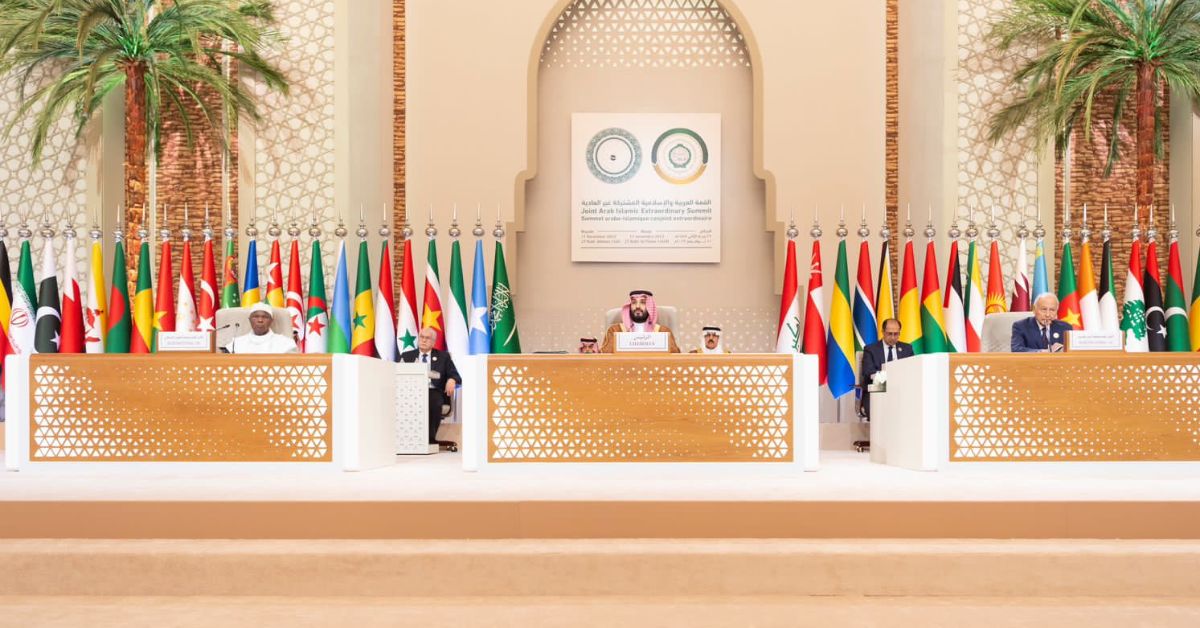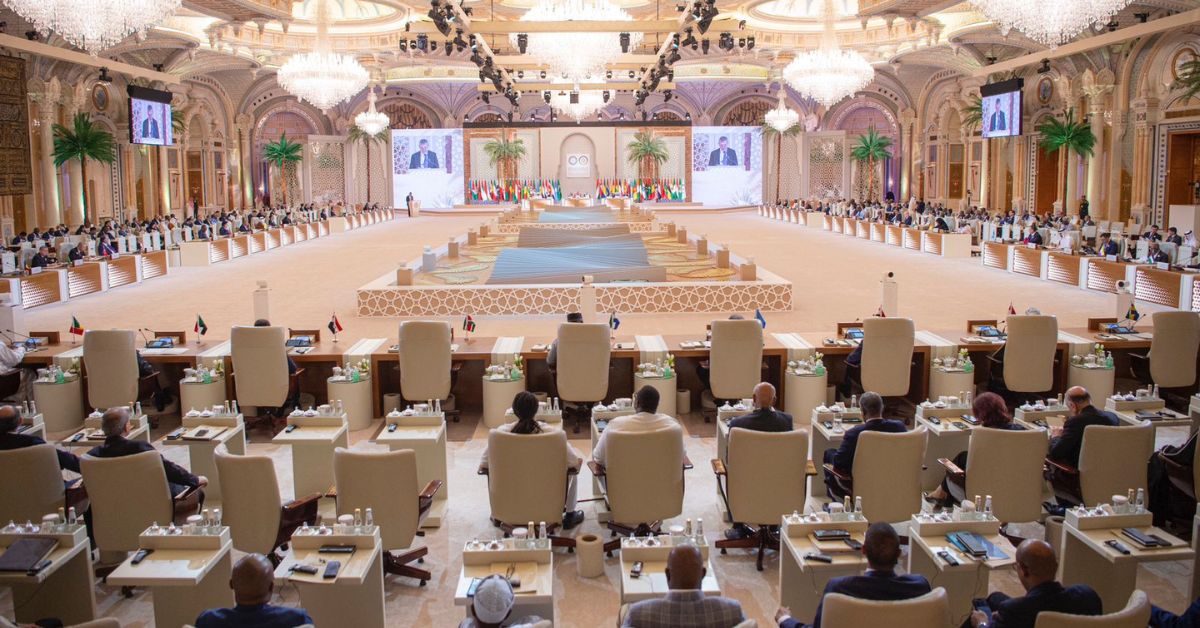Riyadh –In a unified response to the ongoing conflict in the Middle East, the Joint Arab Islamic Extraordinary Summit issued a strong condemnation of Israeli aggression against Palestinians in Gaza and the West Bank, including Al-Quds Al-Sharif.
The leaders denounced the humanitarian catastrophe resulting from these actions and affirmed their commitment to addressing the aggression and supporting the Palestinian people’s rights, including their right to freedom and an independent sovereign state.
The summit, held in Riyadh, concluded on Saturday with a series of landmark resolutions. This gathering, a confluence of leaders from the Organization of Islamic Cooperation (OIC) and the League of Arab States, marked a historic merger of two summits initially planned separately by the OIC and the Arab League.
Also Read Arab, Muslim leaders’ summit condemns Israel over Gaza offensive
Key resolutions included reaffirming previous OIC and Arab League resolutions on the Palestinian cause, recalling United Nations resolutions on the issue, and welcoming the recent UN General Assembly Resolution A/ES-10/L.25.
The summit emphasized the centrality of the Palestinian cause and the necessity of a just, lasting, and comprehensive peace in the region, achievable only through the end of the Israeli occupation and a two-state solution.
#Saudi Crown Prince Mohammed bin Salman addresses the opening of the #ArabIslamicExtraordinarySummit in #Riyadh.@KSAmofaEN @HRHMBNSALMAN @OIC_OCI
— TRENDS (@mena_trends) November 11, 2023
Video credit: @Spa_Eng pic.twitter.com/JbNozzsfUX
The leaders held Israel responsible for the conflict’s continuation and escalation, condemning its violation of international law and systematic aggressive policies. They warned of the war’s potential expansion due to Israel’s ongoing aggression and the Security Council’s inaction.
The summit’s resolutions included demands for the immediate cessation of Israeli aggression, rejection of the war’s characterization as self-defense, and calls for humanitarian aid access to Gaza. It supported Egypt’s efforts in aiding Gaza and urged the UN Security Council to take decisive action against Israel’s violations.
Furthermore, the summit called for an international investigation into war crimes committed by Israel, the establishment of legal monitoring units to document these crimes, and support for Palestine’s legal initiatives against Israeli authorities.

The leaders condemned all forms of hatred and discrimination, warned of the repercussions of Israel’s actions in Gaza, and emphasized the need for a comprehensive peace process. They rejected any attempts to separate Gaza from the West Bank and called for an international peace conference to resolve the conflict based on international law and legitimate resolutions.
The summit activated the Arab and Islamic Financial Safety Net to support Palestine and the United Nations Relief and Works Agency (UNRWA), emphasizing the need for international collaboration in reconstructing Gaza.
Also Read Saudi-African Summit calls for peace in Middle East
The Secretary-General of the Arab League and the Organization of Islamic Cooperation (OIC) have been tasked with overseeing the implementation of these resolutions, with reports to be presented at their respective upcoming sessions.
At the summit, Palestine’s President Mahmoud Abbas vehemently condemned the ongoing Israeli aggression in the Gaza Strip, describing it as a brutal act of violence against innocent civilians. President Abbas highlighted the dire situation in Gaza, where over 40,000 civilians, predominantly children, women, and the elderly, have suffered casualties due to the Israeli military’s actions.
“This attack on the West Bank and Jerusalem, including murders, daily assaults, the extermination of entire families, and the destruction of hospitals, mosques, churches, and schools in the Gaza Strip, by the Israeli occupation forces, is happening within the hearing and sight of the world without an immediate end to this brutal war and to spare our defenseless people from further killing and destruction,” he said.
Excerpts from the inaugural speech of Saudi Crown Prince Mohammed Bin Salman: “This summit is held as we witness extraordinary and painful circumstances, we affirm our condemnation and rejection of the ruthless war to which Palestinians are subjected, in which thousands of unarmed civilians, children, women and the elderly were killed.” “The Kingdom has exerted unremitting efforts since the beginning of the events to protect civilians in the Gaza Strip, and continuously consulted and coordinated with its allies and effective countries to stop the war.” “We reiterate our demands for an immediate halt to military operations, for the provision of humanitarian corridors to aid civilians, and for enabling international humanitarian organizations to perform their role.” “We are witnessing a humanitarian catastrophe that demonstrates the failure of the Security Council and the international community to put an end to the flagrant Israeli violations of international laws and norms, and international humanitarian law.” “We call for working together to lift the siege, bring humanitarian and relief aid, and secure medical supplies for the sick and injured people in Gaza.” “The Kingdom categorically rejects the continued aggression, occupation and forced displacement of the population of Gaza. It also firmly holds the occupation authorities responsible for the crimes committed against the Palestinians and their infrastructure.” “We are certain that to achieve security, peace, and stability is by ending the occupation, siege & settlements, Palestinian people to obtain their legitimate rights & establish an independent state within the 1967 borders with East Jerusalem as its capital.”
He stressed that the international community, particularly the Security Council, must take immediate action to halt the aggression and ensure the provision of essential supplies such as medical aid, food, water, electricity, and fuel to the beleaguered Gaza Strip. President Abbas also called for measures to prevent the displacement of Palestinian people in both Gaza and the West Bank.
Abbas criticized the military and security solutions pursued by the Israeli authorities, which he said have failed and only served to undermine the two-state solution.
He pointed out that these actions have been replaced with intensified settlement, annexation, ethnic cleansing, and racial discrimination policies in the West Bank and Jerusalem, alongside the continued siege of the Gaza Strip and violations of the historical and legal status of Islamic and Christian holy sites.
Highlighting the unity of Palestinian territory, Abbas affirmed that Gaza is an integral part of the State of Palestine and that any political solution must encompass the entirety of Palestinian territory, including the West Bank, Jerusalem, and Gaza. He expressed strong opposition to Israel’s seizure of Palestinian funds destined for Gaza, reiterating Palestine’s unwavering commitment to the Gaza Strip.
Also read Exclusive reports on Gaza-related developments
Iranian President Ebrahim Raisi, on his part, underscored the brutal nature of the Israeli assault on Gaza, emphasizing that the majority of the victims are innocent civilians, including children, women, and medical and relief personnel. He called for an immediate ceasefire and the unrestricted opening of the Rafah crossing, urging a decisive and historic response to the crisis in the Palestinian territories.
Kuwait’s Crown Prince Sheikh Mishal Al-Ahmad Al-Jaber Al-Sabah described the situation in Gaza as one involving indescribable crimes against the Palestinian people. He criticized the Israeli occupation for imposing unjust collective punishment and accused it of displaying double standards, actions contrary to international resolutions and humanitarian principles. The Crown Prince called on the international community, particularly the UN Security Council, to act swiftly to end the bloodshed and ensure international protection for the Palestinian people.
Indonesian President Joko Widodo emphasized Indonesia’s support for the summit, highlighting its critical timing and potential to yield tangible results to end Israel’s violations in Gaza and the prolonged suffering of the Palestinian people. He stressed the need for the Organization of Islamic Cooperation (OIC) nations to unite and demand an unconditional ceasefire. He pointed out that without such a ceasefire, the situation, particularly the killing of civilians in the Palestinian territories, would not improve. President Widodo also underscored the importance of finding ways to persuade Israel to cease fire and allow humanitarian aid.
King Abdullah II of Jordan, in his speech, underscored the summit’s focus on the dire situation in Gaza, where residents have suffered from killings, destruction, and a devastating war that must be stopped immediately. He warned of the potential escalation into a major conflict that could have far-reaching consequences, affecting innocent people on both sides and the entire world.
Djibouti President Ismail Omar Guelleh called for an immediate cessation of the Israeli occupation forces’ barbaric and brutal aggression against the defenseless Palestinian people in the Gaza Strip. He emphasized the need for the immediate lifting of the unjust siege imposed on Gaza and stressed the importance of providing protection for the Palestinian people.
Highlighting the urgency of the situation, President Guelleh urged Islamic countries to take a firm and unified stance to halt the brutal aggression. He underscored the collective responsibility of Islamic nations to protect unarmed civilians in Gaza, affirming their right to life and the necessity of extending assistance and support to them.
“We are watching and observing the double standards and we are reassessing based on this the credibility of international systems. If there is no commitment binding everyone to these foundations, it is difficult to speak of these foundations as unifying foundations,” Saudi Foreign Minister Prince Faisal bin Farhan told a press conference following the summit.







